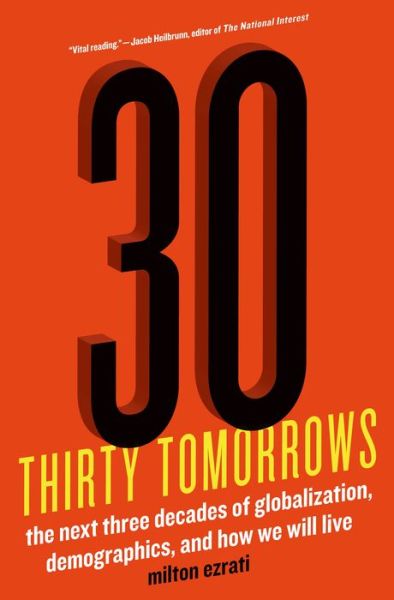Thirty Tomorrows: The Next Three Decades of Globalization, Demographics, and How We Will Live book download
Par rogers carlos le mercredi, novembre 4 2015, 22:56 - Lien permanent
Thirty Tomorrows: The Next Three Decades of Globalization, Demographics, and How We Will Live by Milton Ezrati


Thirty Tomorrows: The Next Three Decades of Globalization, Demographics, and How We Will Live Milton Ezrati ebook
Publisher: St. Martin's Press
Format: pdf
Page: 352
ISBN: 9781250042552
The World Bank data shows that the total number of impoverished Chinese declined by nearly 680 million people in the last three decades. Fast forward just a decade, and you'll see that China's share of the world's poor began to drop. But I suppose we're several decades away from that. It's been decades since we've had any real choice in leaders. So the controversy shall continue unabated. ET on CNN By Global Public Square staff Watching countries from around the world grow and prosper, we tend to assume that global poverty is falling. Dec 18, 2013 - Today's young adults: the leaders of tomorrow Over 12,000 young adults, aged 18-30, across 27 countries, were asked how they felt about the world in which they live, how technology impacts their lives, and their personal goals and dreams. May 1, 2013 - For more What in the World, watch GPS, Sundays at 10 a.m. Jan 21, 2014 - And it is still being pressed today; three decades on, Brand can again be found at TED, as he was this past spring, shirtless, wrestling its delegates in the sort of show worthy of his younger incarnations as one of Ken Kesey's Merry Pranksters or as an organizer of New Games — a form of Clearly we live in an era of counterculture lite, although its two main divisions — Californian and European — are sparring as if the old stakes were on the table (perhaps they are). """ The figures are bleak, and my fear is that if we don't do something about it then we will end up with the biggest security problem I can imagine: revolt. May 29, 2013 - As for us, a century and a half after the publication of Capital, we must challenge the assumption of the necessity and progressivity of capitalism for at least three reasons. Nov 18, 2011 - But unless the 1% starts hiring back the 99%, eventually the 99% will run dry and the 1% will go onto the next country. Feb 21, 2014 - He is also the editor of three anthologies: Another City: Writing from Los Angeles, Cape Cod Noir, and the Library of America's Writing Los Angeles: A Literary Anthology, which won a 2002 California Book Award. And third, the irresponsibility, the said feeling of no tomorrow. Jan 24, 2014 - Teachers instruct the next generation in essential productive skills; and they also socialize them to internalize the norms contributing to conformity to the society's institutions, and so on. Aug 29, 2012 - His headwinds are 1) Demographics: aging and reduced labor-force participation 2) Plateau in US educational attainment 3) "The most important quantitatively in holding down the growth of our future income is rising inequality. But I'm also interested in kind of using that as a broader conversation, which we'll have about the stories that are told about the city and the stories that the city tells about itself and also the way I think in which the city is changing and developing.